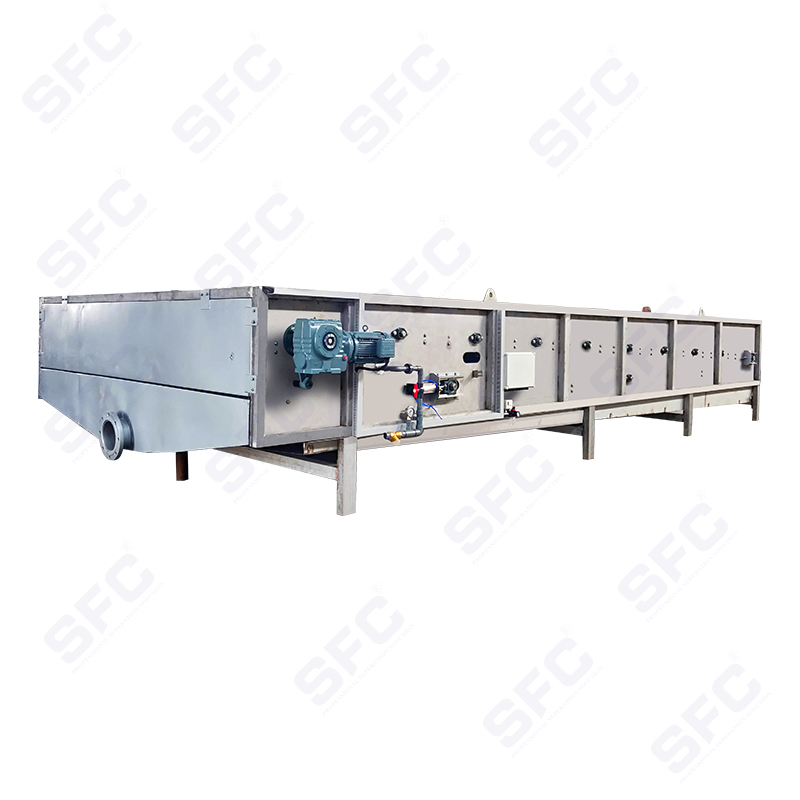Belt Type Sludge Thickener: An Efficient Solution for Wastewater Treatment
In the field of wastewater treatment, sludge management is a critical step that directly impacts operational efficiency and environmental sustainability. Among the various technologies available, the belt type sludge thickener has emerged as a reliable and efficient solution for reducing sludge volume and improving downstream processes.
A belt type sludge thickener is a mechanical device used to dewater and thicken sludge by removing excess water. It employs a continuous filtration process where sludge is fed onto a moving belt, and water is drained through gravity and pressure. The thickened sludge is then collected for further treatment or disposal, while the filtrate (water) is typically returned to the treatment system.
This equipment is widely used in municipal wastewater treatment plants, industrial facilities, and other applications where sludge volume reduction is essential. It is particularly effective for handling large quantities of dilute sludge with high water content.
The operation of a belt type sludge thickener can be broken down into several key steps:
Sludge Feeding: Dilute sludge is pumped onto the belt, which is made of a porous material that allows water to pass through while retaining solids.
Gravity Drainage: As the sludge moves along the belt, gravity causes water to drain out, leaving behind a thicker sludge layer.
Mechanical Compression: In some designs, additional rollers or pressing mechanisms apply gentle pressure to further squeeze out water, enhancing the thickening effect.
Collection: The thickened sludge is scraped off the belt at the end of the process, while the filtrate is collected separately for reuse or further treatment.
The entire process is automated, ensuring consistent performance and minimal manual intervention.

Advantages of Belt Type Sludge Thickeners
1. High Efficiency
Belt type sludge thickeners are highly efficient in reducing sludge volume. They can achieve significant water removal, resulting in sludge with higher solids content. This reduces the cost of transportation and disposal.
2. Low Operating Costs
These systems are designed for energy efficiency and low maintenance. The use of gravity drainage minimizes the need for high-pressure pumps or complex machinery, reducing both energy consumption and wear-and-tear.
3. Compact Design
Compared to traditional thickening methods, belt type sludge thickeners occupy less space, making them ideal for facilities with limited floor area.
4. Environmentally Friendly
By reducing sludge volume and recycling filtrate, these thickeners contribute to sustainable wastewater management practices. They also minimize odor and contamination risks during sludge handling.
5. Versatility
Belt type sludge thickeners can handle a wide range of sludge types, including primary sludge, secondary sludge, and mixed sludge. They are suitable for both municipal and industrial applications.
Applications of Belt Type Sludge Thickeners
Municipal Wastewater Treatment Plants: These thickeners are commonly used to preprocess sludge before digestion or dewatering, improving overall plant efficiency.
Industrial Facilities: Industries such as food processing, paper manufacturing, and chemical production generate large volumes of sludge, which can be effectively managed using belt type thickeners.
Landfill Leachate Treatment: The thickener helps reduce the volume of leachate sludge, making it easier to dispose of safely.
Agricultural Waste Management: Farms and livestock operations can use this technology to manage organic waste and recover valuable resources.
Key Features to Look For
When selecting a belt type sludge thickener, consider the following features:
Material Quality: The belts should be made of durable, corrosion-resistant materials to ensure long service life.
Automation Level: Advanced models offer automated controls for optimal performance and ease of operation.
Customization Options: Some manufacturers provide customizable designs to meet specific capacity or application requirements.
After-Sales Support: Reliable technical support and spare parts availability are crucial for uninterrupted operation.
The belt type sludge thickener is an indispensable tool in modern wastewater treatment systems. Its ability to efficiently thicken sludge, coupled with its low operating costs and environmental benefits, makes it a preferred choice for many industries. As wastewater management continues to evolve, innovations in belt type sludge thickener technology will play a vital role in achieving sustainable and cost-effective solutions. Whether you operate a municipal plant or an industrial facility, investing in this technology can significantly enhance your sludge management capabilities while contributing to a cleaner environment.
















 English
English Español
Español
